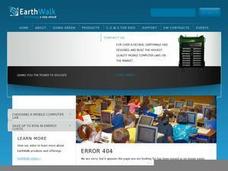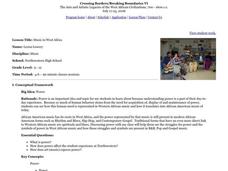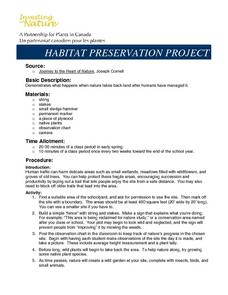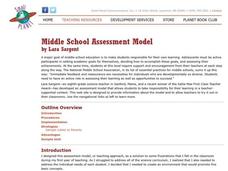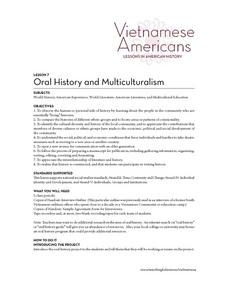Curated OER
Nutrition: Gregory the Terrible Eater
Young scholars listen to a story about a goat who craves human food. They discover the four basic food groups and discuss what they might eat if they were terrible eaters. Students retell the story by looking at the pictures. They...
Curated OER
Strawberry DNA extraction
Students study the basic function of DNA and then extract it from strawberries. In this DNA extraction lesson students examine DNA and see why the extraction of it is so important to scientists.
Curated OER
Science: Suddenly Snow
Students engage in snow-related activities during the first winter snowfall. After explaining the elements needed for it to snow, they preserve snowflakes on frozen slides and observe them under a microscope. Then, they write diamante...
Curated OER
Growth and Changes in Plants
Students investigate the growth and changes in plants. They view a video and discuss the changes in plants. They work in small groups to demonstrate vocabulary words to the class. They visit a green house and take pictures of plants to...
Curated OER
A Place Called Nepal
Learners investigate maps of Nepal and then create their own to disover how human activity is influenced by terrain and climate. Students participate in a trek across Nepal simulation to imagine the challenges people have to face...
Curated OER
Starvation in the Ghettos
Students investigate how human beings survive under camp and ghetto life's extreme condition while understanding the USRDA requirements. They recognize the suffering and loss of life due to the lack of adequate nutrition.
Curated OER
Microbes & History: Microbial influence on the spread of Civilization
Young scholars explore how to extract plant fibers from the flax plant Linum usitatissimum in the process of making linen fibers. Doing so spark interest in the importance of microbial action on the spread of human culture and civilization.
Curated OER
Grammar: Subject-Verb Agreement
High schoolers review basics of subject and verb agreement, and write sentences in which the subject and verb are in agreement.
Curated OER
Toxicology and Living Systems
Learners investigate how toxic chemicals affect biological systems. They determine the toxic dose of a chemical that inhibits seed germination in a Brassica rapa. They investigate the effect of environmental tobacco smoke on human lung...
Curated OER
Sample Activity From The Water Sourcebook
Students explore septic system failures and contamination of groundwater. The complete a worksheet to explore the basic parts of a septic system. In a lab situation, students simulate a septic system failure. They explore coliform...
Curated OER
The Great Kapok Tree: A Social Studies Lesson
Students examine how plants, animals and people need each other in order to survive. They simulate an ecosystem in a food web and role play certain animals or plants. They answer questions about their simulation to finish the lesson plan.
Curated OER
Feeding Your Fish
Students discuss nutrition and diet. They look at copies of Tetra's Daily Nutrition Pyramid for Tropical Fish. They compare the fish feeding pyramid to the pyramid for human nutrition. Students examine a can of fish food.
Curated OER
Music in West Africa
Students explore power and the symbols of power in West African music. They discuss the music of West Africa and compare it to African American music of today. In addition, they investigate musical instruments of Africa, identify the...
Curated OER
Personality Development
Students participate in a variety of activities to help them define their own personalities. They complete questionnaires, play personality Bingo, and compare kaleidoscopes and candy to the variety found in humans.
Curated OER
Animal Adaptations
Students will participate in classroom discussions and visit a website to learn more about animals and how well (or poorly) they've adapted to satisfying their needs in their natural habitats. This will help move them toward the goal, in...
Curated OER
The Global Impact of Insect Borne Diseases & Agriculture
Pupils study the global impact of insect borne diseases, the appropriate use of pesticides, and the concept of human interrelations on a world wide scale. They examine how to safely apply a pesticide, according to the label.
Curated OER
Habitat Preservation Project
High schoolers demonstrate what happens when nature takes back land after humans have managed it. They find an area in the schoolyard, and mark it off with a boundary. Students build a simple fence with string and stakes. They put up...
Curated OER
Costs of Providing for animals
Students explore the necessary costs of animals shelters and taking care of one pet. For this providing for animals lesson, students calculate the costs of keeping a pet. Students understand the need for outside funding for animal shelters.
Curated OER
Winter Survival
Students examine what animals need in order to survive. In this investigative lesson plan students play a "role" of an animal in winter.
Curated OER
Your Dog's Health
Students investigate pet health. In this dog care lesson, students develop knowledge on how to care for a dog. Students discuss what is needed to keep a dog happy and healthy. Students label pictures of of a dog's visit to the vet.
Small Planet Communications
The Nervous System
Eighth graders perform a variety of activities to explore the human nervous system--making posters, charts, presentations, etc. All activities are extremely well designed and planned for clear assessment.
Curated OER
Vital Signs
Students research health-related topics such as good nutrition, exercise, and the human body. They analyze their data and distribute it through the use of the Internet.
Curated OER
Developing a Public Health Service Message
Pupils communicate the biological basis for an aspect of a public health issue in a visual manner. They use the basics of a variety of diseases and epidemics to create their Public Health poster and service message.
Curated OER
Oral History and Multiculturalism
Students observe the human or personal side of history by assessing the background to the people in the community who are basically "living" historians. They compare the histories of different ethnic groups to identify areas of patterns...




